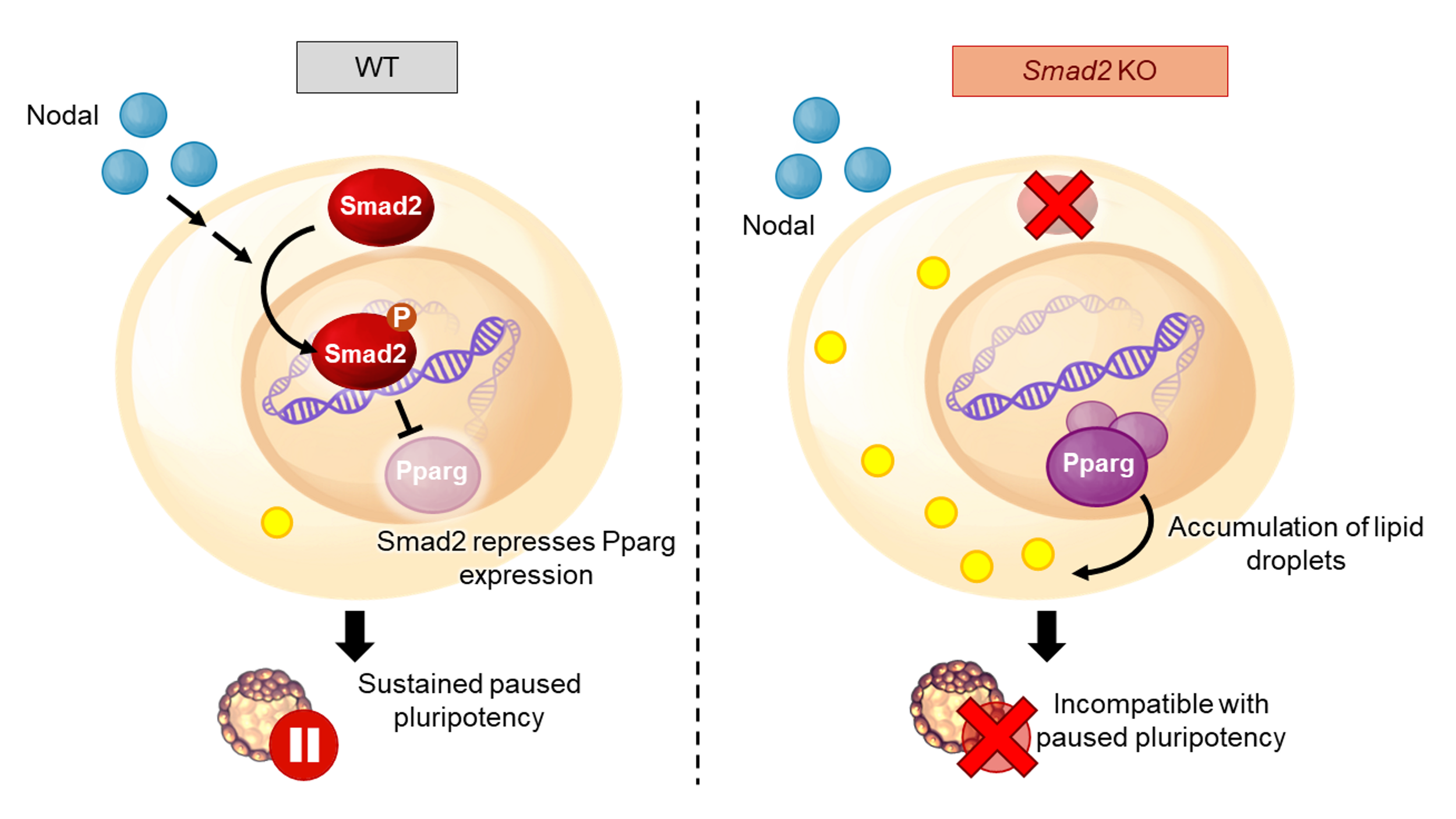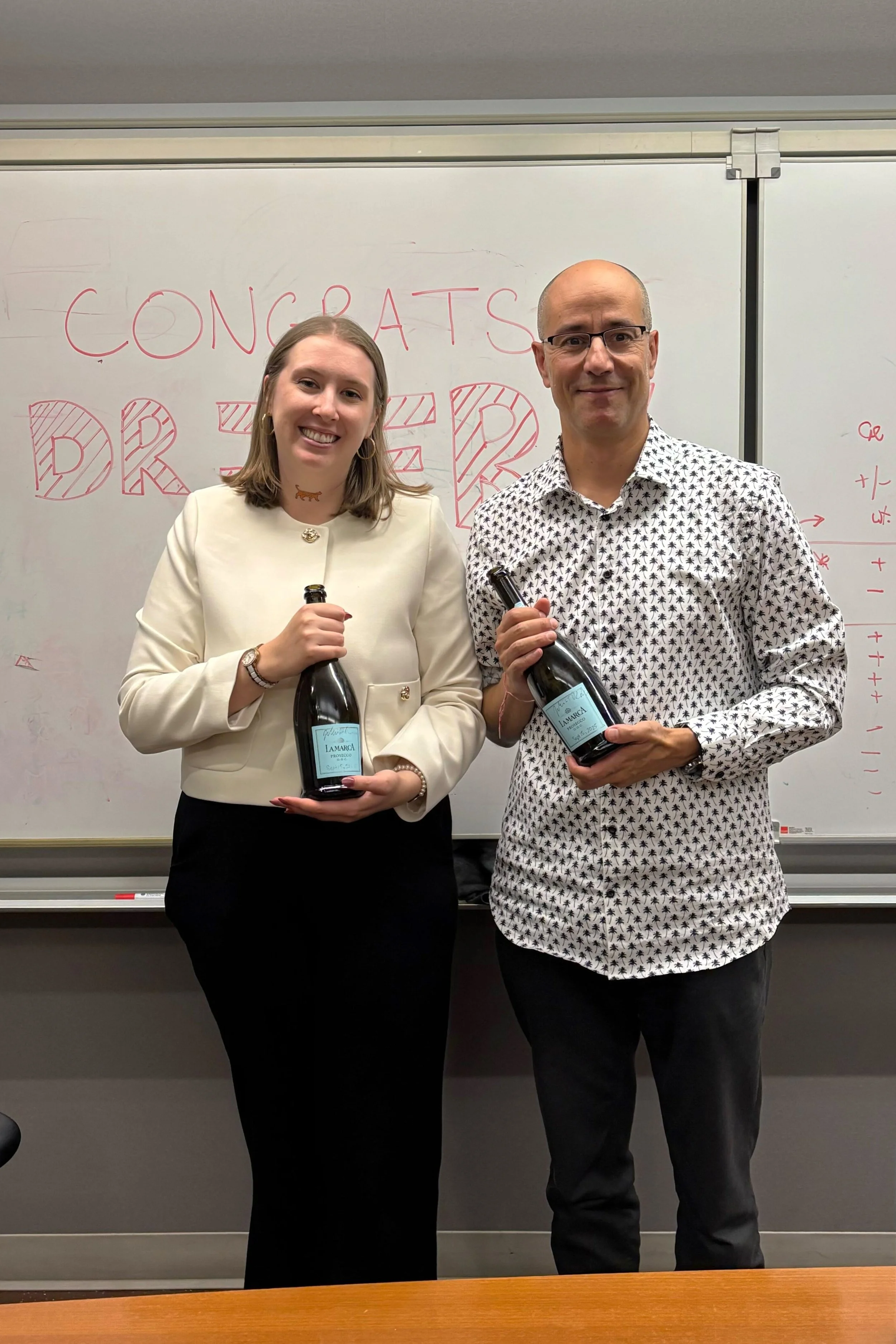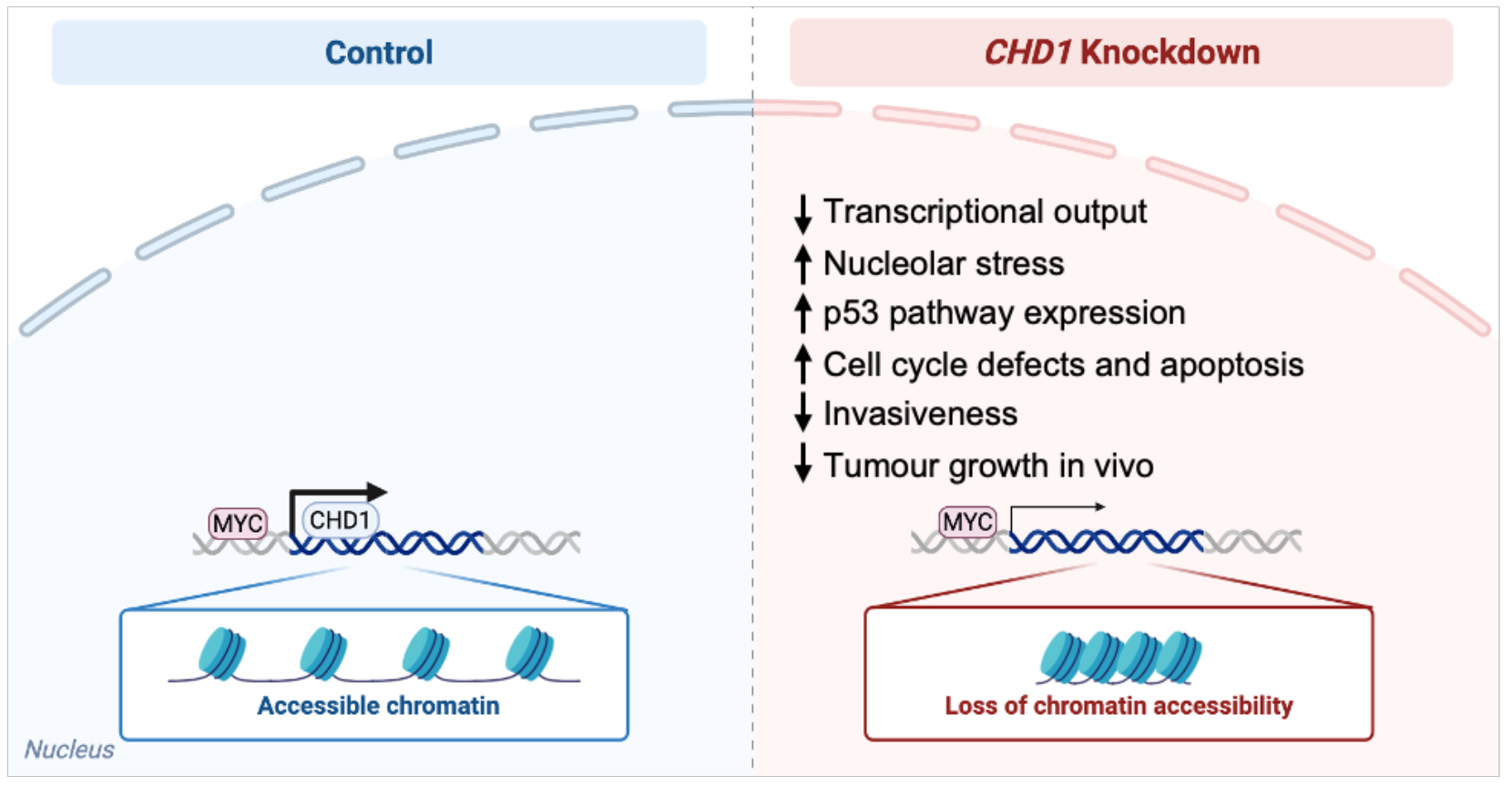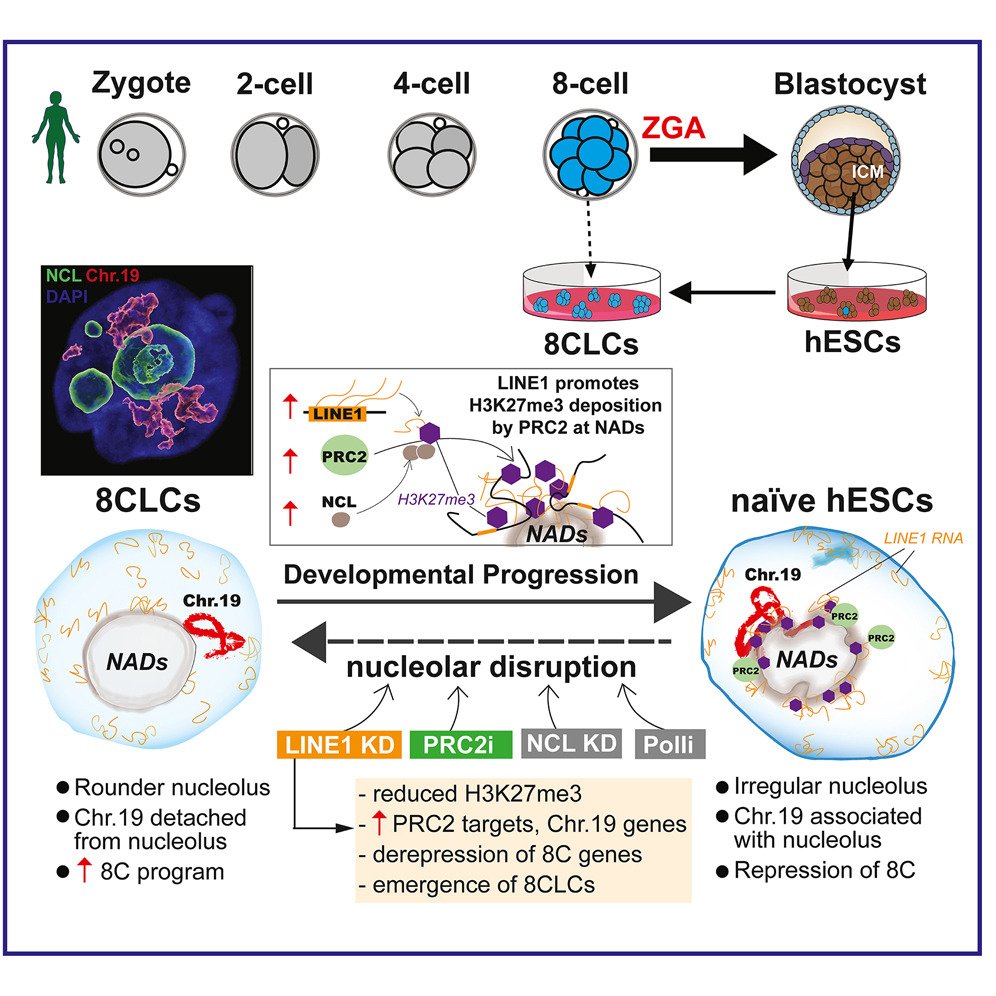Lab News
Signals that tell embryos to go dormant
September 2025 - We discovered that Nodal/Smad2 signaling, a branch of the TGF-β pathway, is essential to sustain embryonic diapause, a reversible state of dormancy. Smad2 prevents lipid storage by repressing the master regulator of metabolism Pparg, linking signaling inputs to chromatin and metabolic control of dormancy. This crosstalk between TGF-β signaling and the Pparg pathway may be redeployed in cancer dormancy and metabolic disorders.
Congratulations to Dr. JFR!
September 2025 - What is happier than having a PhD student graduated in a lab? We have TWO PhDs this year! Great job Julie!
Miguel named Anne & Max Tanenbaum Chair in Molecular Medicine
September 2025 - This is an amazing honor and recognition of our work. Thank you to the Temerty Faculty of Medicine at the University of Toronto and Mount Sinai Hospital for their continued trust and support for our group's research.
CHD1, a regulator of developmental hypertranscription, is an Achilles heel of breast cancer
September 2025 - We found that the chromatin remodeler CHD1 is essential for the survival and growth of MYC-driven breast cancer cells. Knockdown of CHD1 disrupts chromatin structure, inhibits tumor growth, and induces cell death likely through nucleolar stress and p53 activation, uncovering CHD1 as a novel synthetic lethal vulnerability and potential therapeutic target.
Alpha RNA marks the beginning of development
July 2025 - We found that alpha satellite RNA is highly expressed in naïve human embryonic stem cells, where it marks the perinucleolar compartment and tunes ribosomal RNA expression. These findings reveal new regulatory roles of satellite RNAs in nuclear architecture and gene regulation during development.
Brandon is the next PhD in our lab!
June 2025 – Congratulations, Dr. Cho!
Here comes the second U. of Toronto PhD student graduating from our lab! Excellent Thesis Defense! Stay tuned for the publication.
Hypertranscription comes back full circle to stemness
March 2025 – The field of stem cell transcriptomics has come a long way since the beginning of the century, from analysis of bulk populations of cells using microarrays to single-cell RNA-seq.
We found that a stemness signature from 2002 (part of Miguel's PhD work) foreshadowed stem cell hypertranscription, even though it was developed well before it was known what hypertranscription meant or how to detect it.
LINE1 holds together the “dark genome” of embryonic cells
December 2024 – We found that copies of the LINE1 transposon are key “architects” of the nucleolar genome in human embryonic stem cells. The nucleolus is the site of production of ribosomes, the machines that make all proteins, but the sequence and organization of the nucleolar genome have remained largely “in the dark”. This work brings together two facets of Barbara McClintock’s pioneering research: nucleolar organizer regions and transposable elements.
Release of CEEHRC Seminar Video
October 2024 – Release of a Youtube video of a seminar that Miguel and Lamisa gave for the Canadian Epigenetics, Environment and Health Research Consortium (CEEHRC). Provides a good overview of the various lines of research ongoing in the lab.
LINE1 transposon prevents developmental cells from going back in time
October 2024 – Our latest results indicate that a fundamental transition at the onset of early human development is regulated by the expression of long interspersed nuclear element 1 (LINE1) transposons. While transposons are usually regarded as parasitic genomic elements or “junk DNA”, these findings raise fascinating questions regarding the essential contribution of transposons to genome compartmentalization during development. A press release can be found here.
The Yin and Yang of Hypertranscription explained
September 2024 – This review from Santos Lab discusses concepts of hypertranscription and technological advancements to probe global transcriptional shifts in stem cell biology.
Our 1st U of T student to graduate!
June 2024 – Congratulations, Lamisa Ataei!
The first U. of Toronto PhD student graduating from our lab! Thesis defended with flying colors! Keep an eye out for the work.
Unveiling the secrets of transcriptional dormancy in embryonic diapause
September 2023 – We found that m6A RNA methylation, deposited by the methyltransferase Mellt3, is essential for developmental pausing in mouse blastocysts and embryonic stem cells. By dissecting the underlying mechanisms, we found that the transcriptional dormancy of paused cells is dependent on an intricate coordination of mRNA turnover and hypotranscription. This work was highlighted by the University of Toronto’s Molecular Genetics Department.
Absolute scaling of single-cell transcriptomes identifies pervasive hypertranscription in adult stem and progenitor cells
January 2023 – In a new paper we describe methods to detect hypertranscription in single-cell RNA-seq data, and find that hypertranscription is remarkably pervasive in stem/progenitor cells across all major adult organs. We show that adult organ hypertranscription uses many of the same proteins and pathways employed during embryonic hypertranscription. This work has important implications for the regulation of organ maintenance, regeneration and cancer.
Regulation, functions & transmission of bivalent chromatin during mammalian development
August 2022 – During development, mammalian cells display a paradoxical chromatin state: histone modifications associated with gene activation and repression co-occur at promoters of developmental genes. This bivalent chromatin modification state is thought to poise important regulatory genes for expression or repression during cell-lineage specification. In a new, comprehensive review from the lab published in Nature Reviews Molecular Cell Biology, we present the current understanding of the regulation and roles of chromatin bivalency during development. We posit that bivalency is a key feature of embryonic, germline and adult stem cells, and speculate on the intergenerational transmission of bivalency. Finally, we discuss the relevance of bivalent chromatin to human development and cancer, and outline avenues of future research.
Chd1 prevents accumulation of DNA breaks during stem cell hypertranscription
August 2021 – We have previously shown that the chromatin remodeler Chd1, which unspools DNA from nucleosomes to facilitate transcription of DNA into RNA, is essential for stem cell hypertranscription (Guzman-Ayala Development 2015 and Koh Proc Natl Acad Sci USA 2015). In a new publication in Nature Communications, we report that Chd1 promotes repair of endogenous DNA breaks at promoters of transcribed genes, including protein-coding and ribosomal RNA, in stem cells and embryos. Thus, Chd1 is critical to balance the hyperactivity of transcription in stem cells with genome integrity.
Deubiquitinase Usp9x is essential during mouse development
March 2021 – we reported in Nature Communications the discovery that Usp9x, a protein that removes degradation signals from other proteins (thereby promoting their stability), is essential for mouse embryonic stem cells and embryonic development. We found that Usp9x acts by stabilizing the PRC2 complex of proteins, which are key repressors of the expression of genes that drive stem cell differentiation. This Usp9x-PRC2 axis enforces the timely unfolding of genetic programs during development - it may also be reutilized in adult stem cells and dysregulated in neurological disorders and cancer.
Miguel interviewed for Sinai’s Behind the Science
In Jan 2021, Miguel was interviewed as part of Behind the Science, a series from Sinai Health Foundation that asks some of its brightest and world-leading researchers about what drives their curiosity about the human body in health and illness.
Cancer cells enter an embryonic pausing-like state to survive chemotherapy
Jan 2021, we are excited to have been part of a fantastic effort of Toronto labs led by Catherine O'Brien at Princess Margaret Cancer Centre. For a few years we have been studying diapause, the process by which embryos enter a reversible dormant state to survive adverse environmental conditions. We have now found that cancer cells highjack the same molecular and cellular pathways of diapause to survive chemotherapy in a dormant state, so that they can later regrow tumors. The results point to new strategies to target these dormant cancer cells.
Pregnancy on Pause
Oct 2019, our discovery that inhibition of mTOR is key to embryonic diapause Bulut-Karslioglu Nature 2016 continues to attract attention, recently in a very informative video from Scishow.
TranCE (Transcription, Chromatin and Epigenetics) Club founded
In early 2019, Miguel founded the Transcription, Chromatin and Epigenetics (TranCE) Club: every 2 weeks, 2 trainees from labs across Toronto working on these topics present their work. It has been a fantastic venue, fostering interactions and collaborations. Since September 2020, it is entirely run by graduate students, with its own website.
Vitamin C during mouse pregnancy promotes future fertility of the fetuses
Sep 2019, we published an intriguing link between maternal Vitamin C levels during a female fetus’ growth and development, and the future fertility rates of the fetus when it becomes adult. This research has revealed the importance of maternal nutritional environment on fecundity of female embryos.
Lab has first CIHR Project Grant approved
Aug 2019, we are honored to have been awarded our first CIHR Project Grant, which will fund research in the lab on the topic of hypertranscription during development for the next 5 years. Many thanks to the review panel and CIHR for supporting our research.
Miguel Appointed Full Professor at the University of Toronto
On July 1st 2019, Miguel was appointed at Full Professor level at the Department of Molecular Genetics, University of Toronto. A proud moment for the Santos lab!
Santos Lab joins the Medicine by Design Program
In 2019, Our lab has joined and acknowledges the support of the Medicine by Design Program at the University of Toronto, which aims to accelerate paradigm-shifting discoveries in Regenerative Medicine. Miguel is a now a Medicine By Design Investigator.
Role of the transposon LINE1 in Early Development
In 2018 our paper on the role of LINE1 in early development was published in Cell and was highlighted by the press, including in The Atlantic, NPR, Science Magazine, Tech Times and Público.
We Moved from San Francisco to Toronto
In 2018 the lab relocated from the University of California, San Francisco to the Lunenfeld-Tanenbaum Research Institute and the University of Toronto.
Canada 150 Research Chair - Developmental Epigenetics
In 2017, Miguel was awarded the Canada 150 Research Chair in Developmental Epigenetics by the Minister of Science Kirsty Duncan, and Prime Minister Justin Trudeau.




























